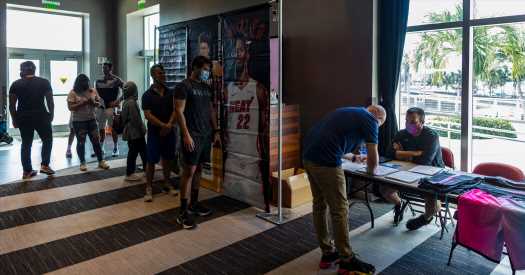The Food and Drug Administration’s independent panel of vaccine advisers is set to meet Friday to discuss the case for booster shots of the Pfizer-BioNTech coronavirus vaccine, and to vote on whether the agency should approve additional doses for people 16 and older.
The meeting and vote, which could significantly influence federal booster policy, come amid a fraught debate within the Biden administration about whether booster shots are needed now, and for whom. If the discussion mirrors the acrimony in the administration, the expert committee may end up divided, complicating the F.D.A.’s decision.
The F.D.A. is not obligated to follow the advice of the committee, but often does. The panel’s meetings earlier in the pandemic to consider vaccine authorizations were mostly agreeable, ending in decisive votes in favor of the F.D.A.’s presumed position.
Top federal health officials, including Dr. Anthony S. Fauci, President Biden’s chief medical adviser, have argued for weeks that immunity against infection is waning in fully vaccinated people, and that there are hints of diminished protection against more severe forms of Covid-19.
Eight of those officials in August signed a policy statement saying that boosters would be needed and that the administration was prepared to deliver them for adults as early as the week of Sept. 20, a decision some public health experts said was premature. But the White House has already been forced to delay offering boosters to recipients of the Moderna vaccine, and for now it is planning third shots only for those who received the Pfizer-BioNTech vaccine if the F.D.A. signs off.
There has been fierce resistance to boosters from some federal career scientists and many vaccine experts outside the government. Two key F.D.A. regulators wrote in The Lancet this week that there is no evidence additional shots are needed yet for the general population, assessing data from dozens of studies. One of them, Marion Gruber, who directs the F.D.A.’s vaccines office, is scheduled to speak at the Friday meeting.
Vaccination remains powerfully protective against severe illness and hospitalization because of Covid-19 in the vast majority of people in all of the studies published so far, experts say. But the vaccines do seem less potent against infection in people of all ages, particularly those exposed to the highly contagious Delta variant.
The World Health Organization has asked world leaders to refrain from rolling out boosters at least until the end of the year, with the goal of immunizing 40 percent of the global population first. But some high-income countries have already begun offering boosters to their residents, and others may follow their lead.
The F.D.A. panel — the Vaccines and Related Biological Products Advisory Committee — is composed of independent scientific experts, infectious disease doctors and statisticians, many of whom participated in earlier meetings about coronavirus vaccines.
The meeting is scheduled to begin at 8:30 a.m. Eastern time and conclude in the late afternoon. (You can watch it here.) A “no” vote on Pfizer’s application could lengthen the discussion and possibly prompt a different vote, such as on whether to recommend clearing the booster for a more limited group.
Understand Vaccine and Mask Mandates in the U.S.
- Vaccine rules. On Aug. 23, the Food and Drug Administration granted full approval to Pfizer-BioNTech’s coronavirus vaccine for people 16 and up, paving the way for an increase in mandates in both the public and private sectors. Private companies have been increasingly mandating vaccines for employees. Such mandates are legally allowed and have been upheld in court challenges.
- Mask rules. The Centers for Disease Control and Prevention in July recommended that all Americans, regardless of vaccination status, wear masks in indoor public places within areas experiencing outbreaks, a reversal of the guidance it offered in May. See where the C.D.C. guidance would apply, and where states have instituted their own mask policies. The battle over masks has become contentious in some states, with some local leaders defying state bans.
- College and universities. More than 400 colleges and universities are requiring students to be vaccinated against Covid-19. Almost all are in states that voted for President Biden.
- Schools. Both California and New York City have introduced vaccine mandates for education staff. A survey released in August found that many American parents of school-age children are opposed to mandated vaccines for students, but were more supportive of mask mandates for students, teachers and staff members who do not have their shots.
- Hospitals and medical centers. Many hospitals and major health systems are requiring employees to get a Covid-19 vaccine, citing rising caseloads fueled by the Delta variant and stubbornly low vaccination rates in their communities, even within their work force.
- New York City. Proof of vaccination is required of workers and customers for indoor dining, gyms, performances and other indoor situations, although enforcement does not begin until Sept. 13. Teachers and other education workers in the city’s vast school system will need to have at least one vaccine dose by Sept. 27, without the option of weekly testing. City hospital workers must also get a vaccine or be subjected to weekly testing. Similar rules are in place for New York State employees.
- At the federal level. The Pentagon announced that it would seek to make coronavirus vaccinations mandatory for the country’s 1.3 million active-duty troops “no later” than the middle of September. President Biden announced that all civilian federal employees would have to be vaccinated against the coronavirus or submit to regular testing, social distancing, mask requirements and restrictions on most travel.
Source: Read Full Article
